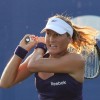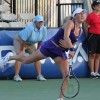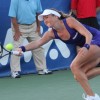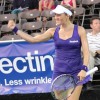By Christopher Lancette
I had planned to conduct a video interview with world No. 24 Shahar Peer in a nice, quiet media tent at the inaugural Citi Open in College Park, Maryland. The lighting didn’t quite do justice to Israel’s highest ranked player ever so we had to stroll outside and have the chat there – smack in the middle of the throng of fans that quickly surrounded us.
It’s hard enough to do a good interview in private, let alone courtside … especially when you’re trying to penetrate the shield that pro athletes naturally thrust between themselves and pesky reporters. The whole point of World Tennis Magazine’s “The Changeover” is to capture glimpses of a player’s humanity.
The result?
Peer didn’t just let her guard down: She opened her mind and her heart. She’s a 24-year-old tennis star on the rise but she’s also a woman with a lot to say about what matters in life.
She even turned the tables on me.
It’s normally my job to put profile subjects at ease so I can extract the best stuff from them but I was a little nervous interviewing Peer on camera in public. I was afraid I was going to flub the pronunciation of her name or the questions I intended to ask. Peer looked me straight in the eyes, though, and made it clear she stood ready to have a real conversation and that I was in good hands with her.
Peer quickly revealed how much some of her school teachers still mean to her today. Faster than she puts away a volley, she also put her livelihood of pro tennis in astonishing perspective.
“Tennis is very important,” she said. “I give everything to tennis, but there are other things except tennis and you need to be smart and to know other things than only hitting the ball.”
We had already established a connection just one minute into the conversation.
Out of the corners of my eyes, I saw the crowd around us increase, leaning in and hanging on her every word. Something special was unfolding. This was not just a star talking about backhands and breakpoint opportunities: The fans were getting to know Peer as a person right along with me.
The moment was right to bring up a conversation I knew would be impossible to cover and exit in the brief time we had together but I had to serve it up.
I asked her about her trip to the Auschwitz concentration camp with her Holocaust-survivor grandmother, Yuliana Eckstein, and her mom in April of 2010. She led “The March of the Living” – an annual walk between the Auschwitz and Birkenau extermination camps. Her grandmother’s parents were sent to the gas chambers at Auschwitz.
Peer spoke gently about what that trip meant, sharing a story that’s best viewed on the video rather than quoted here. Suffice it to say I was spellbound. So was the crowd.
The challenge for me at that moment was to figure out a way to transition from something so depressing to a question that might extract life lessons we as people can learn from what Peer said. I asked her why she has been so willing to use her celebrity status to take on major world issues when so many athletes are afraid to do so. It was Peer, after all, who forced the United Arab Emirates to reverse its policy of not allowing Israeli athletes to play within its borders.
Again, the power of her words are best viewed directly but her concluding thought gave me goose bumps. She responded in the context of making a difference in Middle Eastern relations.
“If I can as a little girl from a small country do something for that and help the Jewish and Arabs kind of be together and understand each other – and be able to know that we are all human beings – that is very important for me.”
I probably should have ended the interview right there but my brain was too busy trying to absorb the magnitude of what she just said. I was also contrasting the person I was interviewing with her persona on the court.
Moments before the interview, I had witnessed her physical power. She pounded ground strokes so her hard in her first Citi Open match against Japan’s Ryoko Fuda that I could have sworn I heard the balls actually yelp. And forget about trying to hit a winner past her: She made the 27 feet from sideline to sideline look as small as a croquet wicket. Peer on that day was invincible and invulnerable.
Yet there she was with me a short time later revealing her tenderness and femininity.
I asked her a final question about her practice of only allowing herself a dessert once a week while I tried to come up with my exit line. She said something about ice cream but I got lost in her deep brown eyes and sweet smile. I was so transfixed by her gaze that I actually forgot my own name as I tried to sign off the interview. I had to switch in mid-breath from what should have been “For World Tennis Magazine, I’m Chris Lancette” to a simple “Thank you so much for joining us.”
No one has ever made me forget my name.
I stood there after we wrapped and watched Peer field another interview, a basic one about the win over the Japanese qualifier. The WTA’s “Strong is Beautiful” campaign came to my mind as she spoke.
If you define strength not just by physical prowess but by character, I thought, Shahar Peer just may be the most beautiful woman in tennis.
Christopher Lancette is a Washington D.C.-area freelance writer. He can be reached by email through is blog at http://dcreflections.typepad.com
[youtube=http://www.youtube.com/watch?v=N92MnIheWhA&w=550&h=343]
Photos © by Won-ok Kim





